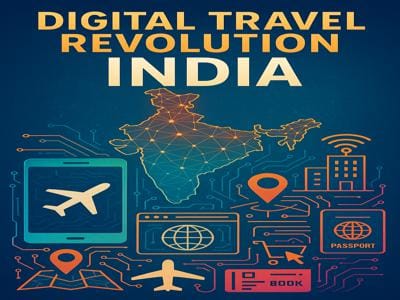Posted in Travel News, Travel Technology
Digital Travel Revolution India

India’s Digital Travel Revolution: A Seamless Global Journey Begins
India is setting a new benchmark in the world of travel by integrating biometric travel systems, AI-powered border security, and digital visa solutions that are reshaping how travelers move across borders. This transformation aims to replace outdated paper systems with advanced technologies that offer speed, security, and comfort. The result? A future of seamless global travel for Indian citizens and visitors alike.
Biometric Travel in India: A New Norm
- One of the most impactful innovations is the adoption of biometric travel in India. Technologies like facial recognition, fingerprint scanning, and iris authentication are rapidly replacing manual checks at major airports. Initiatives like DigiYatra for domestic flights and the Fast Track Immigration – Trusted Traveller Programme (FTI-TTP) for international departures enable travelers to move through immigration without physical documents or queues. Indian nationals and Overseas Citizens of India (OCI) cardholders can now use biometric e-gates for contactless verification—cutting down wait times and improving user experience.
AI-Powered Border Security: Smarter and Safer
- The backbone of this smart travel evolution is AI-powered border security. Advanced artificial intelligence tools are now in place to support real-time risk assessment, pattern recognition, and traveler profiling. These systems help border officials make informed decisions, identify potential threats, and streamline entry or exit without unnecessary delays. The International Air Transport Association (IATA) reports that AI-based biometric boarding can reduce airport wait times by nearly 40%, enhancing not only security but overall efficiency.
Digital Visa Systems India: Easy and Transparent
- In the past, applying for a visa could be a long and uncertain process. But today, digital visa systems in India offer travelers a more transparent and accessible solution. With features like real-time tracking, time-slot booking, multilingual support, and intuitive online interfaces, the process is much more user-friendly. External Service Providers such as VFS Global have simplified the visa journey for millions by digitizing services across more than 158 countries.
Contactless Immigration India: A Frictionless Future
- Gone are the days of long immigration queues and face-to-face interviews. Contactless immigration in India is becoming a standard experience. At airports in Delhi and Mumbai, travelers pass through digital gates using biometric credentials—no stamps, no interaction, just a quick scan. This shift is especially meaningful for first-time international travelers from smaller towns, providing them with a stress-free and empowered journey.
Blockchain Travel Technology: Securing the Future
- Looking ahead, blockchain travel technology holds tremendous potential in securing and verifying travel credentials. Whether it’s for vaccination records, visa histories, or digital travel IDs, blockchain ensures that personal data remains tamper-proof and easily verifiable. As this technology matures, it will form the digital backbone of global travel systems, further increasing trust and data security.
Seamless Global Travel: The New Indian Reality
- The shift toward seamless global travel is no longer aspirational it’s actively unfolding. With AI and biometrics taking over the technical processes, travelers can now enjoy an intuitive, smooth, and personalized journey from entry to exit. Paper documents are giving way to encrypted mobile wallets, digital travel credentials, and integrated airport apps.
- More than 28 million Indians traveled abroad in 2023, signaling a growing appetite for international experiences. For these travelers, the journey begins not at the airport, but through secure digital footprints proof that the future of travel lies in innovation, automation, and inclusive design.
